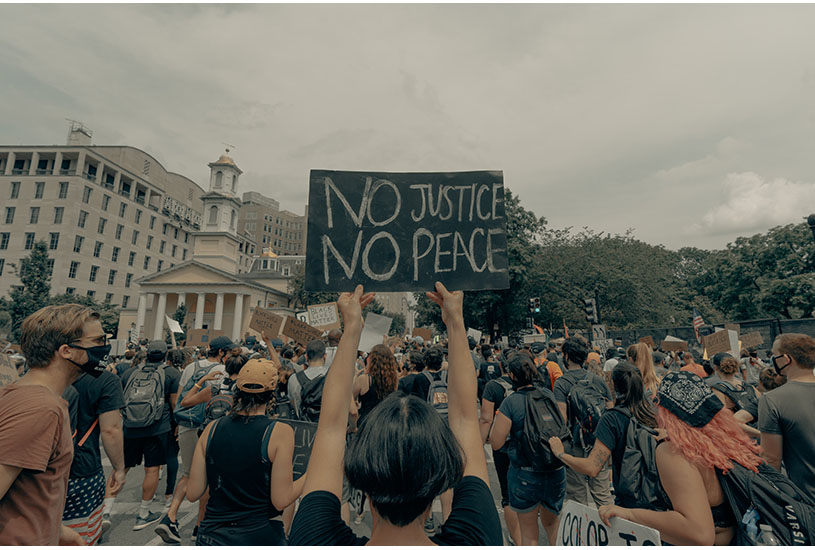The Black Lives Matter movement has continued to draw our collective attention to issues around inequality, identity, racism and the ways that institutions and individuals can perpetuate them.
Originating in the United States (US), the movement and its broader conversation about the treatment of Bla(c)k people and people of colour has gone global.
Deakin University’s Alfred Deakin Institute for Citizenship and Globalisation (ADI) recently hosted a public policy forum titled, ‘The Black Lives Matter movement in the Australian context’.
This discussion, moderated by Associate Research Fellow Lydia Khalil from ADI, sought to investigate the history of the BLM movement, the issues it raises and what the movement means in and for Australia, especially how it intersects with the long history of Aboriginal and Torres Strait Islander activism that preceded this moment.
We would like to showcase the question that kicked off the forum, and encourage you to listen to the full discussion:
What do you say to people who say the Black Lives Matter movement was imported from the United States (US) and has little relevance to Australia?
Professor Marcia Langton AM – Foundation Chair of Australian Indigenous Studies from the University of Melbourne – spoke of the ongoing Aboriginal and Torres Strait Islander deaths in custody.
“Every person in Australia – regardless of who they are, the colour of their skin, cultural background or religion – if you are arrested and incarcerated, you and your families have a right to expect that you will come out of incarceration alive,” Professor Langton said.
“You have a right to expect you will not die in custody.
“You only have to look at the history of Rottnest Island in Western Australia; when tourists go there, they have no idea that they are walking on the graves of hundreds of Aboriginal people who died in custody there.
“The proposition that the Black Lives Matter movement was imported from the US shows an alarming ignorance of the history of race relations and the history of Aboriginal and Torres Strait Islander deaths in custody in this country.”
Meanwhile Bridget Brennan – ABC Europe correspondent, formerly ABC’s National Indigenous Affairs correspondent – discussed her experiences meeting founders of the Black Lives Matter movement, including Patrisse Cullors, and their reactions to the lack of racial literacy in Australia.
“We spoke to young Aboriginal and Torres Strait Islander people who had been inspired by the movement and asked them: why is this US movement relevant to us here in Australia?” Bridget Brennan said.
“Many said it was at the heart of what they had been saying, that Aboriginal and Torres Strait Islander lives matter, that they felt their lives didn’t matter, in this country, in their country, on their Country.”
She noted that historically, the movement has been ongoing in Australia, even before George Floyd’s death.
“If you look at the Day of Mourning in 1938, essentially Aboriginal and Torres Strait Islander people have been saying our lives need to matter for a long time.
“I do think it’s a bit depressing that we have this misunderstanding of our own history and that so many people don’t understand that we do have shared histories with Britain and the US.
“That so many of these lived realities are the same for young Bla(c)k people,” Bridget Brennan said.
Adongwot Manyoul – a South Sudanese Youth Advocate, Community Development Professional and Researcher – describes her personal experiences as an African-Australian to hint at the Black Lives Matter movement’s relevance to Australia.
“As an African-Australian myself, to deny the Black Lives Matter movement’s relevance in Australia is to deny my personal experiences,” Adongwot Manyoul said.
“To deny my brothers and sisters and all my friends of colour that have struggled at the hands of police, who face micro-aggressions every day, who have a hard time getting a job because of their skin colour, who get abused on public transport.
“This whole idea of ‘importing’ doesn’t sit very well with me. Why is it when it comes to racism all of a sudden, we are importing this idea? We’ve imported, if anything, white supremacist ideals.
“We’ve imported segregation and discrimination. It was never here, it came here.
“This concept of importing the Black Lives Matter movement takes away from the seriousness of people here in Australia screaming that Black Lives Matter,” Adongwot Manyoul said.
Dr Berhan Ahmed, CEO of African-Australian Multicultural Employment and Youth Services closed the discussion by asking what kind of world we’re creating:
“Denial has been a fact of this process. This is a constitutional issue. This is a systemic problem. This is a serious problem that sees future generations of children born in a line towards prison, not a line towards education.
“In the 21st century, I see our kids dreaming of education. Instead our kids are born for prison,” Dr Ahmed said.
“That is in itself a question that the nation has to consider: what are we building for the future?”
Deakin University’s Alfred Deakin Institute for Citizenship and Globalisation (ADI) is hosting a number of public policy forums.
We encourage you to listen to the full discussion: ‘The Black Lives Matter Movement in the Australian context’
Keen for more events? Register for ADI’s upcoming four-part seminar series ‘Decolonising Truth in Australia’ discussing reconciliation and ‘truth-telling’ about the past treatment of Aboriginal and Torres Strait Islander peoples.



